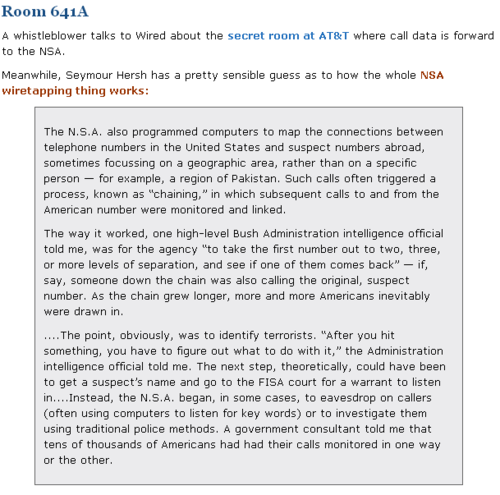Busy-ness and business kept me from blogging about last week's bombshell news: the leaks to Glenn Greenwald and the Washington Post that (a) phone records of Americans are seized en masse by the NSA and (b) everyone's Internet activity is likewise seized.
My immediate thought is: This is news?
Rachel Maddow devoted almost all of her show on Thrusday to something called "Room 641A", a room at the headquarters of AT&T where only one person — an NSA person — has access, and that literally sweeps up every piece of digital data that goes through those wires.
And I thought: This is old news, isn't it? Hell, I was blogging about Room 641A back in May of 2006:

I mean, Glenn Greenwald was screaming about the same thing then. As was I. As was Michael Moore and thousands of others.
And I thought to myself, well, NOW we have a scandal, but it's the same one we've always had. Yes, Obama didn't budge from Bush when it came to protecting the Constitution and warrentless wiretapping. And Congress knew it.
I don't know. Nobody's talking about Benghazi or even the IRS focus on tea parties. The "scandal" is one that implicates not only Obama, but virtually every single Democrat and Republican in Congress who was aware of the program, and voted to continue it. And that was virtually all of them.
It's the fault lines that I find interesting. All of a sudden, neocon Republicans and many Democrats with a non-libertarian streak are defending the program and Obama's use of it. And left-right libertarians (like Greenwald) are screaming bloody murder.
I do have a problem with these programs in principle. I am assured that a FISA court is overseeing these operations to make sure the Fourth Amendment is being violated, but the problem is that the court works in secret, and so that assurance is not very large. I do believe these programs have been successful in preventing terrorist attacks, and I am sympathetic to the "what-do-I-care-there's-nothing-criminal-in-my-emails" stance. I recognize that they are not reading MY personal emails. I recognize that to combat terrorism — which is analagous to finding a needle in a haystack — our intelligence experts need the whole "haystack". I get all that.
But at the same time, the potential for government abuse — not now, perhaps, but sometime — is huge. And nobody likes the idea of living in a surveillance state.
And still on the other hand, everyone seems quite okay with private corporations tracking our whereabouts online and even selling that informatoin to others. This is something in 2013 that just wasn't around in 2007, yet we accept now if somewhat begrudgingly.
I just think it is odd that it is coming up now. We had this battle before. We lost.
UPDATE: And about the leaker, who outted himself yesterday as former Booz Allen Hamilton employee Edward Snowden (now hiding out in China).
Another development with strange fault lines. I mean, Michael Moore and Glenn Beck are calling him a hero. Others are ready to villify for revealing national security secrets.
But his whistleblowing (if you want to call it that) raises another disturbing aspect — the government outsourcing of intelligence gathering. It's because people don't want to pay higher taxes that we cut the number of government employees, and outsource to private companies (which ironically, is actually more expensive). According to a 2013 report from the Office of the Director of National Intelligence, a total of 483,263 contractors held Top Secret clearances in 2012, the highest level one can obtain, with another 582,524 holding them at the Confidential and Secret levels. Even if you're not worried about government abuse of privacy, you should be worried about the private sector as well.

